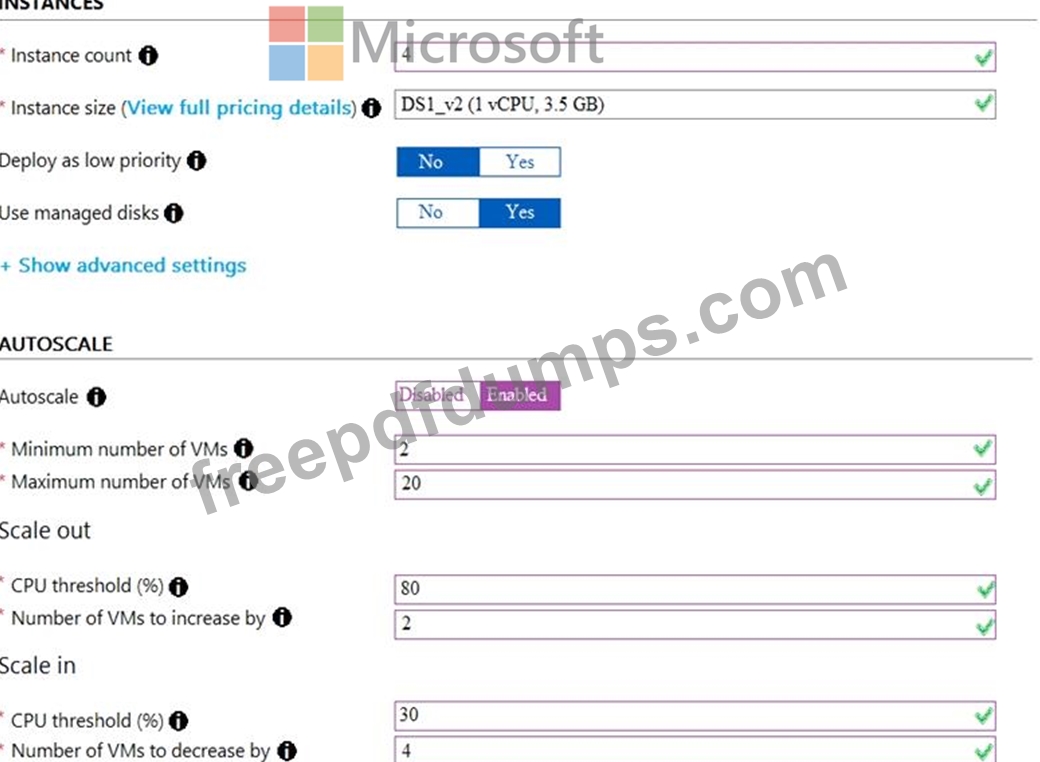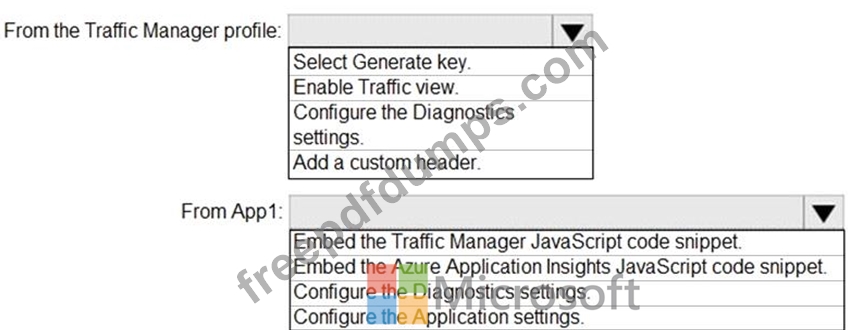AZ-303 Exam Question 61
HOTSPOT
You have a hierarchy of management groups and Azure subscriptions as shown in the following table.

You create the Azure resources shown in the following table.

You have the Owner role. You assign roles to users as shown in the following table.

For each of the following statements, select Yes if the statement is true. Otherwise, select No.
NOTE: Each correct selection is worth one point.
Hot Area:

You have a hierarchy of management groups and Azure subscriptions as shown in the following table.

You create the Azure resources shown in the following table.

You have the Owner role. You assign roles to users as shown in the following table.

For each of the following statements, select Yes if the statement is true. Otherwise, select No.
NOTE: Each correct selection is worth one point.
Hot Area:

AZ-303 Exam Question 62
You create a virtual machine scale set named Scale1. Scale1 is configured as shown in the following exhibit.

Use the drop-down menus to select the answer choice that completes each statement based on the information presented in the graphic.


Use the drop-down menus to select the answer choice that completes each statement based on the information presented in the graphic.

AZ-303 Exam Question 63
You have SQL Server on an Azure virtual machine named SQL1.
You need to automate the backup of the databases on SQL1 by using Automated Backup v2 for the virtual machines. The backups must meet the following requirements:
* Meet a recovery point objective (RPO) of 15 minutes.
* Retain the backups for 30 days.
* Encrypt the backups at rest.
What should you provision as part of the backup solution?
You need to automate the backup of the databases on SQL1 by using Automated Backup v2 for the virtual machines. The backups must meet the following requirements:
* Meet a recovery point objective (RPO) of 15 minutes.
* Retain the backups for 30 days.
* Encrypt the backups at rest.
What should you provision as part of the backup solution?
AZ-303 Exam Question 64
You have a web server app named App1 that is hosted in three Azure regions.
You plan to use Azure Traffic Manager to distribute traffic optimally for App1.
You need to enable Real User Measurements to monitor the network latency data for App1.
What should you do? To answer, select the appropriate options in the answer area.
NOTE: Each correct selection is worth one point.

You plan to use Azure Traffic Manager to distribute traffic optimally for App1.
You need to enable Real User Measurements to monitor the network latency data for App1.
What should you do? To answer, select the appropriate options in the answer area.
NOTE: Each correct selection is worth one point.

AZ-303 Exam Question 65
You configure Azure AD Connect for Azure Active Directory Seamless Single Sign-On (Azure AD Seamless SSO) for an on-premises network.
Users report that when they attempt to access myapps.microsoft.com, they are prompted multiple times to sign in and are forced to use an account name that ends with onmicrosoft.com.
You discover that there is a UPN mismatch between Azure AD and the on-premises Active Directory.
You need to ensure that the users can use single-sign on (SSO) to access Azure resources.
What should you do first?
Users report that when they attempt to access myapps.microsoft.com, they are prompted multiple times to sign in and are forced to use an account name that ends with onmicrosoft.com.
You discover that there is a UPN mismatch between Azure AD and the on-premises Active Directory.
You need to ensure that the users can use single-sign on (SSO) to access Azure resources.
What should you do first?
Premium Bundle
Newest AZ-303 Exam PDF Dumps shared by Actual4test.com for Helping Passing AZ-303 Exam! Actual4test.com now offer the updated AZ-303 exam dumps, the Actual4test.com AZ-303 exam questions have been updated and answers have been corrected get the latest Actual4test.com AZ-303 pdf dumps with Exam Engine here:
(220 Q&As Dumps, 30%OFF Special Discount: Freepdfdumps)




